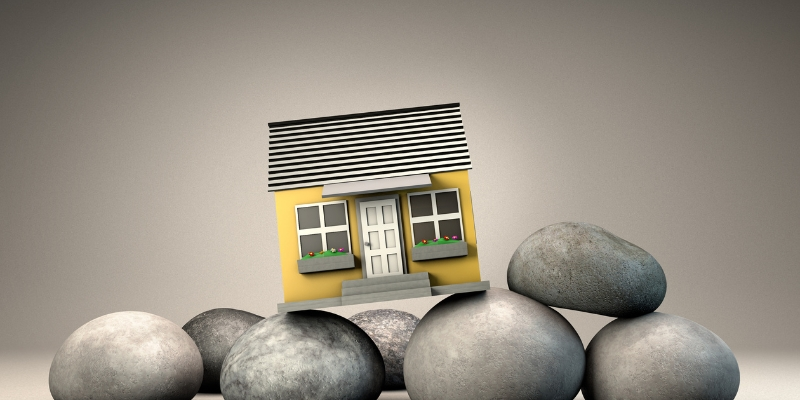
Selling a home is already a big decision—but if your house has foundation issues, it can feel overwhelming. You might be wondering what to fix, what you’re legally required to disclose, and whether it’s even possible to sell “as is.” The good news? You do have options. In this guide, we’ll walk you through everything you need to know about selling a house with foundation problems—from signs to look for to the pros and cons of repairing versus selling as is—so you can move forward with clarity and confidence.
🔑 Key Takeaways
- You can sell a house with foundation issues—either as-is or after making repairs.
- You’re required to disclose any known foundation problems to avoid legal issues.
- Repairs can help you sell for more, but they aren’t always necessary.
- Selling as-is to a serious cash buyer can save you time, money, and stress.
- The best option depends on your goals, timeline, and how much you want to deal with.
Before we get into your options, let’s talk about something important—disclosure.
If you know your house has foundation issues, you’re legally required to disclose that to potential buyers. Skipping this step can lead to serious legal trouble, including lawsuits or canceled sales. But being upfront doesn’t just protect you legally—it also builds trust. Buyers are much more likely to work with you when you’re transparent about what’s going on with the property.
Why Do Foundation Issues Make It More Difficult to Sell Your Home?
Foundation issues can send strong warning signals to buyers—and that often slows things down. A structurally compromised home can sit on the market longer and typically sells for 10–25% less than comparable homes without foundation concerns.
For example, HomeLight reports that properties with foundation problems often experience significant discounts—typically 10–15% off the list price—and take longer to sell. Meanwhile, USTN notes that homes with structural damage can lose up to 25% of their value. That’s why understanding your options—whether to repair the issue or sell to a cash buyer—can make a big difference in your bottom line.
Signs Your House Might Have Foundation Problems

Spotting foundation issues early can help you avoid bigger headaches down the road. Whether you’re planning to sell or just trying to understand your home’s condition, here are some warning signs that often point to foundation trouble:
- Uneven or Sloping Floors: If the floors feel like they tilt or slope when you walk through the home, that could mean the foundation is shifting or settling unevenly.
- Cracks in Walls or Ceilings: Diagonal cracks (especially over doors and windows), stair-step cracks in brick, or large vertical gaps in drywall are common red flags. Minor hairline cracks aren’t always serious, but bigger or widening ones often indicate structural movement.
- Doors and Windows That Stick or Don’t Latch: If they used to open easily but now get jammed or won’t close flush, it might be because the frame has shifted with the foundation.
- Gaps Around Window Frames, Doors, or Baseboards: Visible separation between walls and the ceiling or floorboards can signal movement beneath the surface.
- Leaning Chimney or Exterior Cracks: If your chimney looks like it’s tilting away from the house or there are noticeable cracks in the brick or foundation outside, it’s worth having inspected.
- Bouncing or Sinking Floors: If walking across certain rooms feels “spongy,” that could mean underlying foundation or support beam issues.
- Pooled Water Near the Foundation: While not a sign on its own, consistent water pooling around the base of your house can lead to or worsen foundation issues over time.
Seeing multiple warning signs? Don’t wait.
Foundation problems can get worse (and more expensive) the longer they’re left unaddressed. At TX Cash Home Buyers, we work with homeowners who are dealing with foundation issues and need a real solution—fast. Whether you want to sell the house as-is or explore your options, we’re here to help.
👉 See what kind of offer you could get »
Tip: If you’re noticing more than one of these signs, it’s a good idea to consult with a foundation repair company or home inspector to evaluate what’s really going on.
Common Causes of Foundation Problems
Foundation issues usually don’t happen overnight—they’re often the result of multiple factors that build up over time. Here are some of the most common reasons homes in Texas develop foundation problems:
- Soil Movement: In many parts of Texas, the soil contains a high amount of clay. This type of soil expands when it’s wet and contracts when it dries out, putting a lot of pressure on your foundation as it shifts.
👉 Learn more about how Texas soil affects foundations » - Poor Drainage: If water isn’t draining properly around your home, it can pool near the foundation, soften the soil, and eventually cause it to shift or erode.
- Too Much or Too Little Watering: Sprinkler systems, poor irrigation design, or long dry spells can all contribute to unstable soil conditions. Uneven moisture levels cause the soil to expand and shrink unpredictably.
- Tree Roots: Large trees planted too close to the house can draw moisture from the surrounding soil, leading to shrinkage and uneven foundation settling.
- Substandard Construction: Sometimes, the foundation issues were baked in from the start. Poor grading, shallow footings, or bad soil prep during the initial build can lead to problems later on.
- Seismic Activity (in some areas): While less common in Texas, even small tremors or nearby drilling can disrupt the ground beneath a home in certain regions.
👉 According to the Foundation Repair Association, up to 60–80% of U.S. homes show some signs of foundation movement over their lifetime. It’s more common than many homeowners realize.
Can Foundation Issues Be Fixed? (And What Are Your Options?)
The good news is yes—most foundation problems can be repaired. From minor cracks to major settling, there are proven solutions that can restore the structural integrity of your home.
The most common foundation repair methods include:
- Underpinning (Piering): Steel or concrete piers are inserted beneath the foundation to stabilize and support the structure.
- Slabjacking (Mudjacking): A grout mixture is pumped beneath sunken concrete slabs to lift them back into place.
- Drainage Correction: In some cases, fixing the water flow around the house can help prevent further shifting.
The best method depends on the cause and severity of the issue—so if you’re considering repairs, it’s smart to get an assessment from a reputable foundation repair company.
How Much Does Foundation Repair Cost?

Foundation repair costs can vary widely—but credible industry data gives us a solid picture:
According to This Old House, national costs range from $2,200 to $8,100, with an average around $5,100, while major repairs can reach $30,000
Angi and HomeAdvisor report similar figures—typical repairs are between $2,200 and $8,100, averaging $5,100–$5,166
Forbes Home confirms an average range of $2,250 to $8,600, with a national average around $5,400
📊 Summary Table
| Range | Average Cost |
|---|---|
| $2,200–$8,100 | This Old House, Angi, HomeAdvisor |
| $2,250–$8,600 | Forbes Home |
| ~$5,100–$5,400 | Weighted average from available national sources |
Why Repair Costs Can Go Higher in Some Cases
While most foundation repairs fall within a fairly predictable range of $2,200 to $8,600, costs can increase significantly if the damage is severe or the home requires full structural stabilization.
For example, minor cosmetic fixes like sealing cracks might only cost a few hundred dollars, while more involved repairs—like pier installation or leveling large sections—can run into the tens of thousands. In rare cases, full foundation replacement can exceed $30,000 depending on your location and soil conditions.
✅ Smart Seller Tip
If the estimated repair costs seem high relative to your sale timeline or budget, it may make more sense to sell the house as-is to a serious cash buyer rather than invest heavily in repairs up front.
Should You Fix the Foundation or Sell As-Is?
When foundation issues pop up, many sellers feel stuck between two difficult options: pay for costly repairs or try to sell the house as-is. But the right decision comes down to your specific situation—your timeline, your finances, and how much stress you’re willing to take on.
🛠️ Repairing the Foundation Might Make Sense If:
- You’re in no rush to sell
- You have the cash or financing available to pay for repairs
- Your home is in a high-demand area where the return on repairs might be worth it
- You want to attract traditional buyers using financing (many lenders require homes to be structurally sound)
Repairs may help you increase the sale price and avoid objections during inspection. But they come with no guarantees, and you’ll still need to factor in time for scheduling, permitting, and the repair work itself.
🏃 Selling As-Is Might Be Better If:
- You’re dealing with a tight timeline, financial hardship, or relocation
- You’ve inherited a home and want a clean, quick exit
- The cost of repairs feels too risky or overwhelming
- You’d rather trade a slightly lower price for convenience, speed, and certainty
Selling as-is—especially to a cash buyer—lets you skip the repairs, showings, and stress. It’s often the best option when you just want to move forward without delay or extra costs.
🔍 Unsure What to Do? Get a Pro’s Perspective
If you’re torn, it can be helpful to get a professional opinion. A structural engineer can tell you how serious the foundation damage is—and whether repairs are necessary or optional. This can guide your decision and even help you explain the situation to potential buyers.
Want to Sell Without the Headaches of Foundation Repairs?
We help Texas homeowners sell houses with foundation problems—no repairs, fees, or drawn-out timelines. If you’re looking for a simpler way to move forward, we’ll walk you through your options and make a fair cash offer.
👉 Get your free, no-obligation offer »
What Are Your Options if You Want to Sell a House With Foundation Problems?
Once you discover foundation problems, you’re not stuck—you have multiple paths forward. The right choice depends on your timeline, financial situation, and how much effort you’re willing to take on.
Most homeowners choose one of three approaches:
- Make the necessary repairs, then list the home traditionally
- Sell the house as-is, often to a cash buyer
- Offer seller concessions to negotiate with a buyer without doing the repairs yourself
Each option has trade-offs—so it’s important to choose what works best for your situation.
Offering Seller Concessions Instead of Making Repairs
If you’re not up for handling major foundation repairs but still want to keep the deal alive, seller concessions can be a smart workaround.
This typically means offering the buyer a credit at closing—either to help cover repair costs or reduce their overall expenses. It gives the buyer flexibility to handle the repairs on their own terms, while allowing you to avoid the hassle of coordinating contractors or paying out of pocket before the sale.
This option works best when selling to buyers using traditional financing, since it keeps the home eligible for a loan without requiring you to complete all the work upfront.
What Happens if the Buyer’s Inspection Finds Foundation Issues?
Even if you don’t make repairs before listing, most buyers will still order a home inspection—and foundation problems can raise red flags.
Here’s what could happen:
- The buyer might request repairs or ask for a price reduction
- They could walk away if the foundation concerns feel too risky
- Negotiations may reopen, which can delay your closing or cost you money
That’s why many sellers with known foundation issues choose to be upfront early—or simply work with buyers who are already comfortable purchasing the property in as-is condition.
Selling to a Cash Buyer: A Simpler Option
For many homeowners, the idea of repairs, inspections, and drawn-out negotiations feels overwhelming. That’s where a cash offer can be a huge relief.
At TX Cash Home Buyers, we specialize in purchasing houses with foundation issues—no repairs, fees, or showings required. You don’t have to fix anything, and you don’t have to wait. Just tell us about the property, and we’ll give you a fair offer based on its current condition.
It’s one of the simplest ways to move on without the extra stress.
👉 Start your free cash offer today »
Final Thoughts: You Don’t Have to Tackle This Alone
Selling a house with foundation issues can feel like a heavy lift—but it doesn’t have to be. Whether you decide to fix the problem, offer concessions, or sell the property as-is, there are real solutions that fit your situation.
At TX Cash Home Buyers, we’re here to simplify the process. We’ve helped homeowners all over Texas sell homes in less-than-perfect condition—and we’re happy to help you explore your options with no pressure and no obligations.
Related Articles
- How Texas Soil Can Damage Your Home’s Foundation
- Messy Title Problems in Texas: What Every Homeowner Needs to Know
- Selling a Problem Property? Here’s the Fastest Way
- Can You Sell a House with Mold Problems? Yes, Here’s How
- 7 Essential Tips for Selling an Old House Fast In Texas
- How to Sell a Condemned House: Understanding Condemnation
Frequently Asked Questions
Can I legally sell a house with foundation problems in Texas?
Yes, you can. Texas law allows homeowners to sell houses with foundation issues—but you’re required to disclose any known problems to buyers. Being upfront not only keeps you compliant, but also builds trust with serious buyers.
Is it better to fix foundation issues before selling?
It depends—fixing the foundation can help increase your sale price, but it’s not always necessary.
If you have time and money, repairs may make sense. But if you’re on a tight deadline or don’t want to invest in fixes, selling as-is to a cash buyer is a faster, low-hassle option.
How much does foundation repair cost in Texas?
Foundation repairs in Texas typically cost between $2,200 and $8,600, with an average around $5,400.
Minor cracks may cost less, while major structural issues like pier installations can exceed $30,000. Costs vary based on location, damage severity, and repair method.
What if I can’t afford to fix the foundation before selling?
You can still sell your house as-is or offer repair credits to the buyer at closing.
Many sellers choose to work with cash buyers to avoid out-of-pocket costs and lengthy timelines. We regularly help Texas homeowners in this exact situation.
Will my homeowner’s insurance cover foundation repairs?
Most homeowner’s insurance policies do not cover foundation repairs from normal settling or soil movement.
However, coverage might apply if the damage is caused by a covered event, like a burst pipe. Always check your specific policy for exclusions.
How do cash buyers handle homes with foundation issues?
Cash buyers purchase homes in as-is condition, including those with foundation problems.
At TX Cash Home Buyers, we evaluate the property’s current state and make a fair, no-obligation offer—no repairs, formal inspections, or delays required.
What’s the fastest way to sell a house with foundation issues in Texas?
The fastest way to sell a house with foundation issues is to work with a local cash buyer who specializes in as-is properties.
Cash buyers skip inspections, repairs, and financing delays—so you can close in as little as 7–14 days.
Do I have to tell buyers about past foundation repairs in Texas?
Yes, in Texas you must disclose any known foundation repairs or structural issues, even if they were fixed.
Sellers are legally required to be transparent in the seller’s disclosure notice, which helps avoid future disputes.
Can I still get a mortgage on a house with foundation problems?
Most lenders will not approve a mortgage on a home with unresolved foundation issues.
That’s why many sellers choose to fix the foundation first—or sell to a cash buyer who doesn’t need financing.
Disclaimer:
The content provided on this blog is for informational purposes only. We are not attorneys or tax professionals. For personalized legal or tax advice, please consult with a qualified professional.
Written by Lisa Martinez, Founder of TX Cash Home Buyers

About The Company
TX Cash Home Buyers helps Texas homeowners sell quickly and simply — even in tough situations like repairs, inherited homes, or financial stress. Founded by Lisa Martinez, we’re known for our local experience, fair offers, and commitment to guiding sellers through off-market sales with clarity and care.





